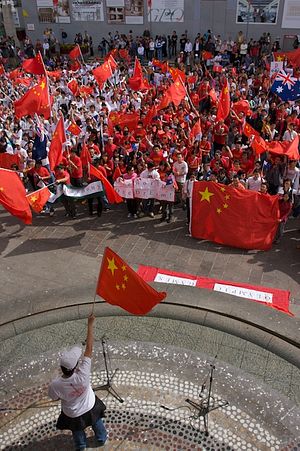Recently, The Diplomat has featured several pieces exploring the nationalism behind China’s foreign policy. Guest author David Gitter looks at Chinese admiration for Russian President Vladimir Putin, and argues that Chinese people and officials alike find something missing from Beijing’s own policies in Putin’s actions. Putin is celebrated for his willingness to stand up to the West (read: the U.S.), something Chinese hardliners want to see Xi Jinping doing more often. Today, China Power blogger Zheng Wang points out the immense perception gap between China and other regional countries. China sees itself as the victim, not the aggressor, in territorial disputes, Wang writes. What other countries see as bullying, China sees as standing up for itself.
Both Gitter and Wang recognize and identify a prevalent strand of Chinese foreign policy thinking — the idea that China can and must stand up to the West (particularly America) after centuries of national humiliation. This foreign policy viewpoint is not new; similar tenets were laid out in the 1996 book China Can Say No. The book was a collection of impassioned essays decrying Western disdain for China, and the importance of China being able to defend its interests against Western attempts at containment. In an interview with National History, one of the authors, Song Qiang, later admitted that the tone of the book might have gone overboard — “we basically wanted to ‘shock people or die trying,’” he said — but he stood by the basic premise. China must “say no… to the culture of foreigner worship, no the mentality of inferiority,” Song said.
Many of the ideas in China Can Say No remain highly influential in Chinese foreign policy thinking today, both at the grassroots and the official level. First, Western countries (and particularly the U.S.) are believed to be conspiring against China, with the goal of preventing China from reclaiming the power and influence it enjoyed prior to the Opium Wars and the “century of national humiliation.” If anything, this idea has grown more pervasive in the last 20 years, as China and the U.S. are increasingly acknowledged to be in a strategic competition for influence in the Asia-Pacific (and even as far away as the African continent).
As a result, Chinese people view their country as a victim, as Wang noted, a lone fighter trying to eke out its fair share of global influence from the established powers. The idea that “China can say no” still holds powerful emotional sway today — in fact, as China’s power (whether military, economic, or diplomatic) has grown, the expectation has only grown that China can and will “say no” to foreign challenges to China’s national interests. Accordingly, Beijing is pushing hard for a reevaluation of issues that the U.S. has long considered routine (such as arms sales to Taiwan and presidential meetings with the Dalai Lama). China previously accepted such insults because it was weak, the thinking goes. Now that China is strong, all bets are off.
When we look at China’s foreign policy shift over the last five years, the attitudes driving policy haven’t really changed. What has changed is China’s ability to act on a nationalist foreign policy vision that has always existed. In the territorial disputes, this means China now has the naval and aerial ability to increase patrols of disputed regions, plus the economic and diplomatic clout to ignore protests from its neighbors and the U.S. For another example, imagine the reaction China would have today if a U.S. bomb struck a Chinese embassy, as happened in Yugoslavia in 1999. The same impulses — anger, suspicion, rage at the lack of respect — would be at work, but the reaction born of these impulses would be far more potent.
U.S. analysts often point out that China cannot afford to antagonize all its neighbors, much less Washington. What is sometimes missed is that Chinese leaders, from a domestic viewpoint, cannot afford to not challenge the U.S. and regional rivals, particularly where China’s “core interests” are involved. Chinese today are far more confident in their country’s abilities than there were 20 years ago, and thus more confident that China can (and will) “say no.”
This dilemma between foreign policy realism and domestic constraints should be easily recognizable to U.S. pundits, as we see our politicians wrestling with the same dilemma when it comes to U.S.-China relations. Analysts agree that a stable U.S.-China relationship is crucial to global prosperity, but when was the last time any U.S. politician won an election by promising to improve relations with China? Chinese leaders must walk a similar tightrope between the need for peace and a conflicting need to appear tough and decisive when dealing with a major strategic rival.
Understanding the long-rooted trends at work in Chinese foreign policy, as Zheng Wang argues, is critical for an accurate understanding of Beijing’s decision-making. The “China can say no” mindset dictates, for example, that U.S. proposals on how to deal with the South China Sea disputes (such as the recent call for a freeze on provocative actions) will be dismissed out of hand. And here lies the heart of the current strategic impasse: the U.S. still believes it is the region’s best hope for a peacemaker and mediator, while China is increasingly vocal about rejecting U.S. initiatives as unwelcome interference in Chinese affairs.

































